Brent Marchant's Blog, page 71
January 22, 2020
This Week in Movies with Meaning
Reviews of “1917” and “A Hidden Life,” as well as a look back at 2019’s best and worst, are all in the latest Movies with Meaning post on the web site of The Good Media Network, available by clicking here.

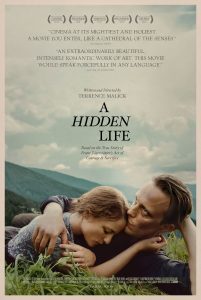


The post This Week in Movies with Meaning appeared first on Brent Marchant.
‘1917’ shows us the reality of reality
“1917” (2019). Cast: George MacKay, Dean-Charles Chapman, Colin Firth, Benedict Cumberbatch, Mark Strong, Andrew Scott, Richard Madden, Daniel Mays, Claire Duburcq, Roland Maaser. Director: Sam Mendes. Screenplay: Sam Mendes and Krysty Wilson-Cairns. Web site. Trailer.
How aware are we of our existence? We may think we have a good handle on it, but do we really? Sometimes we need a “reality check,” where we’re thrown into a scenario that gives us a greater and more mindful appreciation of the realm in which we find ourselves. That can be a rude awakening, for sure, as a pair of young soldiers discover for themselves in the new wartime drama, “1917.”
With the brutal combat of World War I stuck in a virtual stalemate between opposing British and German forces on the ravaged French landscape, it appeared as though the woefully deadlocked battle would rage on in perpetuity unless some kind of significant break in the impasse occurred. Yet, as unlikely as that possibility began to seem, in April 1917, it looked as though just such a development was starting to emerge. German troops began what appeared to be a retreat, leading British forces to believe that their enemy was at last on the run, opening up an opportunity for an assault that would give them the upper hand. There was just one problem with that assessment: British military intelligence learned that the alleged German retreat was a ruse to trap the advancing British soldiers, leaving front-line forces vulnerable, for all practical purposes, to a battlefield massacre. And, since the German troops cut the communications lines in their withdrawal, there was no way to warn Allied forces of what they were up against.

To prevent a disaster, British Gen. Erinmore (Colin Firth) commissioned two of his soldiers, Lance Cpl. William Schofield (George MacKay) and Lance Cpl. Thomas Blake (Dean-Charles Chapman), to traverse the battle-scarred countryside to deliver a warning to Col. Mackenzie (Benedict Cumberbatch), commander of the front-line troops. The young recruits were thus charged with embarking on a dangerous journey to be carried out on a tight time frame. And, with the lives of 1,600 British soldiers at stake, including the older brother of one of the messengers, Lt. Joseph Blake (Richard Madden), success was absolutely crucial.
Under harrowing conditions, the two young soldiers thus begin their arduous journey. Along the way, they encounter all manner of battlefield horrors, including countless unburied decaying corpses, packs of enormous ravenous rodents, booby-trapped bunkers and relentless enemy snipers. They also witness disasters, such as a tragic biplane crash and a village set ablaze whose burning buildings resemble the gates of hell. To be sure, there are allies to be had, too, such as a convoy of British troops led by wise and compassionate Capt. Smith (Mark Strong), who offers profoundly insightful advice about delivering the warning if the messengers indeed succeed in their task. But, even with such assistance, the journey is a race against time – and tragedy – to prevent an even greater calamity from happening.

Lance Cpl. William Schofield (George MacKay, center) desperately seeks to deliver a warning to the commander of British troops being set up for a trap by German forces in the compelling new World War I drama, “1917.” Photo by François Duhamel, courtesy of Universal Pictures and DreamWorks Pictures.
“1917” is an intriguing film in a number of ways, both in terms of its face value messages, as well as its deeper, metaphysical meaning, qualities conveyed both by the picture’s narrative and its approach in telling that story. Both are accomplished by a common root, the beliefs that made it all possible, both in the minds of the characters in the script and in the imagination of the filmmakers. And, in each case, these accomplishments are attained thanks to the conscious creation process, the philosophy that maintains we draw upon these powerful metaphysical tools in manifesting the reality experienced both in the lives of the characters on the screen and in the minds of audience members viewing their story as it plays out.
One of the key themes in this picture is its depiction of the hell of warfare, and drawing upon World War I to do that is an intriguing choice. Given that it was essentially the first modern conflict, it represented the first time that new types of weapons capable of inflicting horrific damage were used. In many ways, it wasn’t clear just how destructive they could be until they were actually deployed, and this war provided that opportunity. It showed us, for better or worse, just how deadly and devastating they could be, something that began to open eyes about where the practice of warfare could be headed. Instead of being celebrated as a grand adventure for young, impressionable, naïve youth, war was, likely for the first time, beginning to be seen as the atrocity it is. And this film, while graphic but not gratuitous, depicts that for viewers, particularly those who may have gone into the theater believing otherwise.

Lance Cpl. William Schofield (George MacKay, right) and Lance Cpl. Thomas Blake (Dean-Charles Chapman, left) cross battle-ravaged France to deliver a message to their fellow British troops in director Sam Mendes’s latest offering, “1917.” Photo by François Duhamel, courtesy of Universal Pictures and DreamWorks Pictures.
This is by no means meant to denigrate the heroism of the courageous soldiers who went off to war to fight what they believed was a noble cause. The efforts of the brave young corporals to relay their message under harrowing circumstances is by all means something to be saluted, even if the film’s larger message is designed to get us to question the wisdom of how we end up getting ourselves into situations where we need to tackle tasks like this in the first place. From the characters’ perspective, we get to see their beliefs laid out before them in the reality they experience, offering them glimpses of the nobility they cling to, as well as the sheer terror that accompanies this scenario. And, from a filmmaker’s perspective, given this complex and contradictory mixture of influences involved here, seamlessly blending them into a single narrative requires striking a delicate balance that shows the validity of each set of beliefs and what they ended up manifesting.
Which is where the creator’s astutely insightful storytelling techniques for this tale come into play. Director Sam Mendes, with the collaboration of legendary cinematographer Roger Deakins, filmed “1917” as if it were one long, continuous shot. By filming the picture in this way, the audience is with the protagonists for the entire movie, always by their side, as if viewers were vicariously part of the narrative. In fact, the only way one can realistically get away from the story would be to get up and leave the theater.

British Gen. Erinmore (Colin Firth, center) commissions two of his troops to deliver a warning to his front-line troops being set up for a trap by German forces in the compelling new World War I drama, “1917.” Photo by François Duhamel, courtesy of Universal Pictures and DreamWorks Pictures.
By shooting the film in this way, Mendes gives viewers a front-row seat to the action, an in-your-face way of letting the audience in on the perils that the protagonists face. It’s a technique that effectively enhances the themes of heroism and horror that the picture conveys to those watching it. In many regards, it makes the story seem more “real” than if it were told using more conventional filming techniques, making the experience more “personal” for the viewer, something that I believe is critical to depicting exactly what constitutes the wartime experience – and makes us think twice about why we would consciously create circumstances consisting of such conditions in the first place.
On an even more metaphysically fundamental level, “1917” not only drives home the reality of the wartime experience, but it also makes reality in general seem more “real” than movies or other visual media produced with more traditional practices. On a philosophically instructional level, that makes this a truly important film, one that clearly depicts “the reality of reality.” In an age where it’s easy for us to tune out and lose touch with what’s going on around us, “1917” helps to increase our awareness of the existence that surrounds us, intrinsically connecting us and making apparent what role we play within it. That’s quite an accomplishment for a film that superficially would seem to be just telling us a war story, a quality that really allows it to make its mark in the world of cinema.

Lance Cpl. William Schofield (George MacKay) enters a French town set ablaze by allegedly retreating German troops, creating a scene resembling the gates of hell, in the compelling new World War I drama, “1917.” Photo courtesy of Universal Pictures and DreamWorks Pictures.
Despite a somewhat slow beginning, this otherwise-gripping tale somewhat reminiscent of “Gallipoli” (1981) takes viewers on a first-person journey through battle-ravaged Europe. By bringing the war to the front row of the theater, audiences get to experience the terror of the conflict through a story capable of genuinely frightening viewers better than any of the best horror flicks on the market. The fine lead performances of MacKay and Chapman, along with Deakins’s stunning photography, Thomas Newman’s riveting score and Mendes’s expert direction, combine to make this truly one of the year’s best offerings. The effect may leave viewers feeling a bit claustrophobic and shell-shocked at times, but then that’s a sure sign the filmmakers have done their job.
“1917” has been lavishly praised in this year’s awards competitions. The National Board of Review named it one of 2019’s Top 10 films and bestowed a special achievement award to Deakins for outstanding cinematography. At the Golden Globes, the film won awards for best dramatic picture and best director, along with a nomination for best score. In the Critics Choice Award contest, “1917” took home honors for best director (tied with Bong Joon Ho for “Parasite”), cinematography and editing, as well as five additional nominations, including best picture. In upcoming competitions, the film has earned nine nominations in the BAFTA Awards, including best picture and director, and 10 Oscar nods, including best picture, director and original screenplay. That’s quite a haul for a truly impressive picture.

Getting a warning to British Col. Mackenzie (Benedict Cumberbatch, right) in time to prevent a battlefield massacre is the assignment given to Lance Cpl. William Schofield (George MacKay, left) in the highly decorated World War I drama, “1917.” Photo by François Duhamel, courtesy of Universal Pictures and DreamWorks Pictures.
In an age where we find our senses being increasingly dulled by all sorts of distractions, it can be easy to lose track of what constitutes our reality. It’s a practice we engage in at our peril, for, if we lose sight of our existence, we may eventually lose sight of ourselves, wandering about lost in a reality where we have no connection to our surroundings, how they arose or how we got there. Films like “1917” help to shake us out of that complacency, waking us up to what’s going on and forcing us to become aware of how we respond to it. Ideally, it would probably be better to not have to be pushed into such circumstances, but, just in case we need a potent reminder, we have examples such as this to wake us up – and to keep us from drifting off into scenarios we’d much rather avoid.
Copyright © 2020, by Brent Marchant. All rights reserved.
The post ‘1917’ shows us the reality of reality appeared first on Brent Marchant.
January 20, 2020
Check out The Cinema Scribe
Tune in for the latest Cinema Scribe segment on Bring Me 2 Life Radio, Tuesday, January 21, at 2 pm ET, available by clicking here. And, if you don’t hear it live, catch it later on demand!


The post Check out The Cinema Scribe appeared first on Brent Marchant.
January 17, 2020
‘A Hidden Life’ pushes us to listen to our heart
“A Hidden Life” (2019). Cast: August Diehl, Valerie Pachner, Maria Simon, Karin Neuhäuser, Matthias Schoenaerts, Franz Rogowski, Bruno Ganz, Tobias Moretti, Ulrich Mathes, Karl Markovics, Michael Nyqvist, Johannes Krisch, Johan Leysen, Alexander Fehling, Ida Mutschlechner, Maria Weger, Aennie Lade. Director: Terrence Malick. Screenplay: Terrence Malick. Web site. Trailer.
Following our conscience often poses us with some of the most potent dilemmas we will encounter during our lifetimes. Such situations force us to confront doing what we believe to be the right thing in the face of circumstances that would seek to compel us to respond otherwise. The effect may be confounding, perhaps even paralyzing, but it generally pushes us to follow our hearts and minds, to address our innermost beliefs in being true to ourselves. So it was for a mild-mannered everyman saddled with dire conditions in the new fact-based historical drama, “A Hidden Life.”
In the idyllic mountain village of St. Radegrund, Austria, the horrors of World War II seem a world away. In fact, it’s the perfect setting for peasant farmer Franz Jãgerstãtter (August Diehl) to live out the life of peace and contentment that he so fervidly loves. With his wife Fani (Valerie Pachner) and their three daughters (Ida Mutschlechner, Maria Weger, Aennie Lade), Franz carves out a modest but comfortable living, eventually inviting his mother, Rosalie (Karin Neuhäuser), and Fani’s sister, Resie (Maria Simon), to come live with them. Together they all share good relations with their neighbors in this tightly knit community, and they derive ample solace from their involvement with the local Roman Catholic parish under the guidance of Father Fürthauer (Tobias Moretti). It’s an existence that gives them everything they need.

Peasant farmer Franz Jãgerstãtter (August Diehl) enjoys an idyllic life in the mountain village of St. Radegrund, Austria in spite of the ravages of World War II hanging over him and his family in the new fact-based historical drama, “A Hidden Life.” Photo by Reiner Bajo, courtesy of Fox Searchlight Pictures.
Unfortunately, the outside world unavoidably intrudes upon their way of life. With Austria under the control of Adolf Hitler’s Third Reich, all eligible men are called upon to partake in basic military training. Franz initially resists the idea, but he eventually relents, fulfilling his civic obligation. However, upon word of France’s surrender, with many believing that the war will be over soon, Franz is sent back home, hoping his duty is behind him and giving him encouragement that he can return to a normal life permanently. But, as quickly becomes apparent, the war is far from over, and Franz is called up for military service.
Franz is more troubled about serving as a soldier than he was about going through basic training. The reason: He’s unwilling to take the oath of allegiance to Hitler and the Third Reich that all new recruits are required to make. When he considers what the Nazis have done to the German people and the residents of neighboring countries, he can’t bring himself to pledge his loyalty to a regime whose policies and practices he fundamentally disagrees with. He’s sincere about his opposition, and, to demonstrate his reluctance, he even goes so far as to consult the head of the local diocese, Bishop Fliesser (Michael Nyqvist), for advice. However, in doing so, Franz doesn’t get the answer he expects; rather than the Bishop telling him he should follow his conscience, he’s told that he has a duty to the Fatherland that he must honor lest his loyalty be called into question.
What’s more, when word of Franz’s hesitancy to pledge his allegiance spreads throughout St. Radegrund, he’s labeled a traitor. He and his family are demonstrably ostracized by most community residents, and the town’s mayor (Karl Markovics) openly chastises Franz for his disloyalty. As Franz wrestles with his decision, life at home becomes increasingly difficult for everyone.

Farmer Franz Jãgerstãtter (August Diehl, center) and his wife, Fani (Valerie Pachner, right), derive tremendous faith from their Roman Catholic parish in the face of perils threatening to destroy their peaceful existence in World War II Austria in writer-director Terrence Malick’s “A Hidden Life.” Photo by Reiner Bajo, courtesy of Fox Searchlight Pictures.
After considerable soul-searching, Franz finally decides to report for duty, much to Fani’s dismay. He believes he must fulfill his obligation. But, despite this sense of responsibility to his country, he has no intention of taking the oath, honoring his responsibility to himself. And, when he follows through on this intention, he’s thrown in jail, first in a holding facility in Enns and then later in a prison in Berlin.
While awaiting trial for his “crime,” Franz is subjected to all manner of brutality at the hands of prison guards, not to mention the harsh living conditions of this new existence. His only source of comfort throughout this ordeal is his ability to exchange letters with Fani. His love for his wife fills him with the strength he needs to carry on, a feeling that she likewise draws upon to keep up with the demands of running the farm. But, as time passes, Franz’s prospects look progressively bleak as he holds fast to his decision.
When the time for Franz’s trial comes, his lawyer (Alexander Fehling) urges him to take the oath, given that it will almost assuredly result in dismissal of the charges against him. In fact, given the looming consequences, Franz’s attorney tries to convince him to take this step even if he doesn’t mean what he says. But Franz remains resolute, knowing that a lie would be a betrayal to himself on par with the repulsion he would feel for actually taking the oath. And so he places conscience before coercion, a decision that leaves him in a precarious position and facing an uncertain future, one whose impact is certain to affect both Franz and everyone he loves.

Austrian farmer Franz Jãgerstãtter (August Diehl, right) puts up a brave front as he bids farewell to his wife, Fani (Valerie Pachner, left), as he leaves his mountain village to fulfill military obligations during World War II in “A Hidden Life.” Photo courtesy of Fox Searchlight Pictures, © 2019 Twentieth Century Fox Film Corporation.
Difficult situations such as this test the resolve of even the strongest among us. These kinds of circumstances pit us against ourselves, most notably our innermost beliefs, scenarios that can carry significant consequences. The importance in this rests with the fact that our responses to such challenges ultimately affect what we experience. And that’s because our beliefs shape the reality in which we find ourselves, the cornerstone principle of the conscious creation process, the philosophy that maintains we draw upon these metaphysical building blocks in manifesting our existence.
Franz has indeed set himself up for quite a test through his experience. As an openly conscientious objector – something virtually unheard of in his day and age – he places his personal beliefs before those of what’s expected of him. And, even though he ends up reporting for duty, he can’t bring himself to take the next step, one that he believes in his heart is wrong, despite the consequences involved.
Franz’s actions are significant for a variety of reasons. Not only are they an act of defiance to circumstances with which he fundamentally disagrees, but they are also a shining example of the principle of integrity, one of the key elements that affects the functioning of the conscious creation process. When we incorporate this principle into the beliefs that go into our manifestation efforts, we infuse the process with a heightened sense of personal earnestness, a quality that reflects the sincerity of our being, something that enables us to be supremely truthful with ourselves. And that, in turn, allows us to materialize a reality most in line with what we genuinely believe, one that most faithfully aligns with our innate heartfelt convictions.
Given what Franz adheres to, he truly faces quite an arduous path going forward. However, the beliefs behind these developments mirror who he really is. As becomes apparent in the film, he’s a devout man of faith who staunchly abides by his principles. If he’s to live with himself, he knows he must follow his heart, no matter how difficult his personal odyssey might be. He simply can’t capitulate to the mentality of being someone who’s “just following orders.” By maintaining his sense of integrity, he significantly increases the likelihood that his reality will fall into line with his beliefs, no matter what that may entail.

Conscientious objector Franz Jãgerstãtter (August Diehl, right) faces the brutality of prison life when he refuses to swear an oath of allegiance to Adolf Hitler and the Third Reich as part of his military service during World War II in the new fact-based historic drama, “A Hidden Life.” Photo by Reiner Bajo, courtesy of Fox Searchlight Pictures.
Some might question the wisdom of Franz’s beliefs and actions in light of the consequences he faces. However, perhaps one of his missions in life is to set an example for others, to become a prototype for the conscientious objector model, something that no one may have done before (or at least not as openly as he does). It could be that a sentiment like the one expressed by Franz may play a vital role in helping to reshape a culture predicated on war and violence, especially if enough other individuals follow his lead. But, if the example he sets is to catch on, it has to start somewhere with someone, and maybe that’s where Franz comes in as a volunteer willing to establish the standard and make it known to the world, perilous though that course may be.
Charting such unknown territory requires a great deal of courage, and that’s another element that factors into Franz’s beliefs. By being willing to confront his fears, he gives himself the personal strength and fortitude he needs to follow this path. As conscious creators are well aware, the philosophy draws heavily upon the notion of “nothing ventured, nothing gained,” and that’s especially true in heroic endeavors like this. By fortifying himself in this way, Franz further increases the chances of being able to fulfill his aspirations and achieve something that the world has never seen before. That’s especially crucial for ventures that stand to benefit us all, both individually and collectively.
In taking the steps that he does, Franz freely embraces his sense of personal responsibility, an inherent aspect of conscious creation. That’s vital, because it’s something we can’t escape when we engage in this practice, no matter how readily or reluctantly we may embrace (or even recognize) this intrinsic connection. Franz knows what he’s doing, in spite of the consequences, yet he does so anyways, accepting conditions for what they are. He realizes that he must do this if he’s to live his truth and attain his goal, no matter how problematic that may be for him and those he cares about.
Accepting responsibility is also essential for those of us seeking to live out our value fulfillment, the conscious creation concept associated with being our best, truest selves for the betterment of ourselves and those around us. For those of us looking to invoke this in an initiative aimed at helping to change the character of society, this is critical if we hope to succeed. Franz rises to the occasion on this front, and, even though his story may not have been well known until now, his legacy has been established, one that’s worthy of being emulated in helping us to create a better world for everyone.

When faced with a perilous fate for her imprisoned husband, Fani Jãgerstãtter (Valerie Pachner, center) travels to Berlin from her Austrian mountain village to provide much-needed comfort and strength in Terrence Malick’s “A Hidden Life.” Photo courtesy of Fox Searchlight Pictures, © 2019 Twentieth Century Fox Film Corporation.
While writer-director Terrence Malick’s stream of consciousness style of filmmaking may not be for everyone, he certainly presents his best example of this kind of work in his latest offering. As with nearly all of his pictures (which are known for including beautiful imagery for its own sake and not necessarily as a means for moving the story forward), this release could still use some judicious editing, considering its nearly three-hour runtime. However, given that this fact-based film features a more narrative-driven focus than some of his other works, that change, coupled with his signature style, make for a moving combination, one that’s simultaneously touching and beautiful to look at. Diehl and Pachner give quietly impassioned performances as protagonists wrestling with crises of conscience in World War II Austria, set against the beauty of their native countryside and the ugliness of Adolf Hitler’s Nazi regime. Admittedly, this picture may try the patience of even the most diehard moviegoer, but it’s worth sitting through even the slow passages given the rewards on offer.
“A Hidden Life” entered awards season with high hopes of significant recognition after winning the François Chalais Award and receiving a distinguished Palme d’Or nomination at the 2019 Cannes Film Festival. However, once the contenders in year-end competitions were announced, the picture didn’t live up to expectations. While the release was named one of the National Board of Review’s Top 10 Independent Films, its only other recognition came in the form of an Independent Spirit Award nomination for best feature. Considering that the crop of eligible 2019 releases left something to be desired, it’s unfortunate that this offering was summarily excluded from so many award programs.

It would be quite a world to live in if we were to have more individuals like Franz in our midst. Indeed, if we had just one courageous soul like him for every 10 others who believed and acted contrarily, our society and the greater reality of which it’s a part would likely be a very different place. That’s why it’s so important that the inspiring stories of heroes like this humble Austrian farmer are shared with the world, to provide us with examples of how to live differently than how we’re told, to bring about an existence in which we’re truthful with ourselves and courageously fulfill our intents to live lives in line with our hearts. It’s a possibility, to be sure, but it’s up to us to envision such an existence – and then to take the steps necessary to make it happen.
Copyright © 2019-20, by Brent Marchant. All rights reserved.
The post ‘A Hidden Life’ pushes us to listen to our heart appeared first on Brent Marchant.
January 16, 2020
The Best – and Worst – of 2019
With another year coming to a close, it’s time for my annual review of the best – and worst – in cinema of the past 12 months. And what a generally disappointing year it was. Truly great films were few and far between, with only a handful earning the status of being genuinely outstanding. Some offerings were commendable, and many were adequate, but quite a few were sorely lacking. In fact, in compiling my list, I had far less trouble coming up with my Bottom 10 than I did with those at the top, something that speaks volumes about the quality of 2019’s offerings. This is something that’s reflected in this year’s field of Oscar nominees as well, a subject that will be addressed separately in an upcoming blog. A supplemental entry for my favorite documentaries of the year – of which there were quite a few in 2019 – is also under preparation.
In the meantime, though, here are my choices for this year’s cream of the crop and this year’s cold porridge.
THE BEST
“Diane”
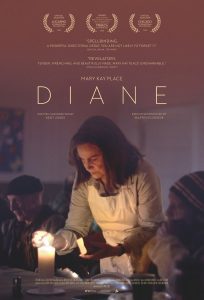
This subtle, thoughtful little drama is rich in insight and symbolism, elevating a seemingly everyday tale to the height of inspired storytelling. Independent Spirit Award nominee Mary Kay Place gives an excellent performance in an uncharacteristic dramatic role, backed by a superb cast of supporting players that includes Andrea Martin, Estelle Parsons, Deirdre O’Connell and Jake Lacy. Director Kent Jones’s debut offering, an ISA nominee for best first feature, proves that a film can quietly entertain and enlighten without explosions going off every few minutes.
“Birds of Passage” (“Pájaros de verana”)
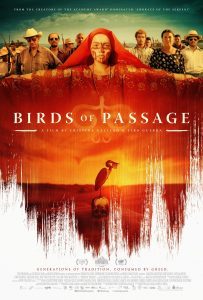
Though occasionally predictable and somewhat meandering in the middle, this excellent Colombian offering on the rise of the drug trade and its impact on the country’s native people is otherwise well executed on all fronts. With fine performances, beautiful cinematography and a nuanced though sometimes-rote script, “Birds of Passage” succeeds in telling a familiar story in an unfamiliar setting. Directors Cristina Gallego and Ciro Guerra present a heartbreaking story of paradise lost and hopeful rebirth from the ashes of tragic ruin, a truly powerful cautionary tale that will leave you moved in myriad ways.
“Luce”
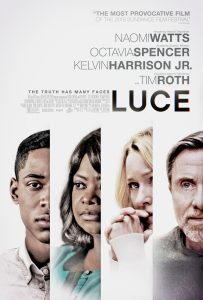
Director Julius Onah’s riveting psychological thriller, filled with endless twists and turns, leaves audiences in suspense right up until the very end. What’s more important, though, is that the film forces us to face some incendiary questions about race, redemption, privacy, trust, perception and prejudice, all the while showing us that things may not be as simple or clear-cut as they seem. The picture’s superb script, fine film editing and excellent ensemble cast (most notably Naomi Watts, Andrea Bang, Tim Roth, and Independent Spirit Award nominees Octavia Spencer and Kelvin Harrison Jr.) make for one of the best offerings of 2019, a release worthy of serious viewer consideration.
“Rocketman”

Director Dexter Fletcher’s flamboyantly engaging film biography of pop icon Elton John hits all the right notes from start to finish. The film’s inventive song-based approach to this character study adds punch to the storyline, playing like a good old-fashioned musical, one that actually works in today’s often-cynical cinematic landscape. Golden Globe winner and Screen Actors Guild Award nominee Taron Egerton gives a career performance as the rock idol who had, and nearly lost, everything. Admittedly, this offering is nothing what I expected, but it exceeds all of what I hoped for. Regrettably, the film has been largely ignored by the Oscars (including an inexcusable snub for Egerton), but it has thankfully earned numerous awards and a boatload of well-deserved nominations in other contests. Rock on!
“1917” (Full review to come)

Despite a somewhat slow beginning, this otherwise-gripping World War I tale, filmed ostensibly as one long continuous shot, takes viewers on a first-person journey through battle-ravaged France as two British soldiers try to warn their fellow troops about an impending trap set for them by allegedly retreating Germans. By bringing the war to the front row of the theater, audiences get to experience the terror of the conflict up close, a story capable of genuinely frightening viewers better than any of the best horror flicks on the market. The fine lead performances of George MacKay and Dean-Charles Chapman, combined with the stunning photography of Roger Deakins, the riveting score of Thomas Newman and the expert direction of Sam Mendes, coalesce to make this truly one of the year’s best. The effect may leave you feeling a bit claustrophobic and shell-shocked at times, but then that’s a sure sign the filmmakers have done their job, an effort that earned the film two Golden Globe Awards (including best dramatic picture), three Critics Choice Awards, 10 Oscar nominations (including a nod for best picture) and an array of honors in other competitions. This is the kind of grand, sweeping epic that Hollywood does well – albeit not often enough.
“The Report”
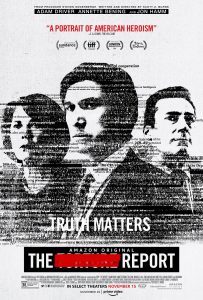
Director Scott Z. Burns’s meticulously detailed, methodically explained offering tells the story of Sen. Dianne Feinstein’s efforts to prepare and release a report exposing the fraud and failings of the CIA’s post-9/11 Enhanced Interrogation Techniques program, particularly the government’s campaign to squelch criticism about its questionable effectiveness. Excellent performances by Adam Driver, Maura Tierney, Golden Globe nominee Annette Bening and a fine ensemble of supporting players enliven a story that otherwise would have been painfully talky and deathly tedious. The picture’s razor-sharp script not only delivers the facts, but it does so with edgy wit and just the right amount of cynicism to reveal the true nature of what was really going on during a turbulent period in the nation’s history, when ethics were sacrificed on the chopping block of expediency and the fulfillment of dubious agendas. This release didn’t receive much attention when it was in theaters, but it’s a smart, savvy, eye-opening offering that every truly loyal American should see.
“The Farewell”
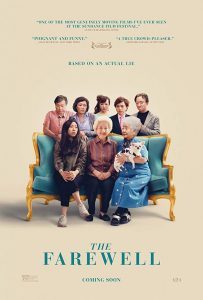
Director Lulu Wang’s excellent comedy-drama about how to handle an impending family tragedy is one of the most capably made, thoroughly satisfying films of this or any other year. With excellent performances by Golden Globe winner Awkwafina and Critics Choice and Independent Spirit Award nominee Shenzhen Zhou, as well as a superb, smartly written script, the picture takes viewers on an emotional rollercoaster, from laughter to tears to heartfelt warmth and back again. There’s so much to like here that it’s difficult to get one’s hands around everything it has to offer. However, despite a smattering of nominations in various competitions, including National Board of Review honors as one of 2019’s top 10 independent films, it’s unfortunate that this release has not received wider attention during awards season, including, unfortunately, not a single Oscar nomination. Keep the hankies handy.
“Marriage Story”
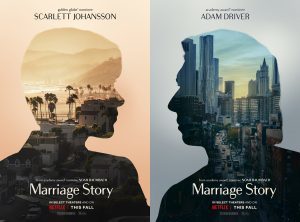
While some have aptly said that this film covers ground that’s been addressed before and that it occasionally plays like both a therapy session and a legal consultation, writer-director Noah Baumbach’s latest nevertheless offers viewers an engaging mix of heartache and humor, showing the pain and utter absurdity that frequently go into the dissolution of a marriage. The truly superb ensemble cast, with excellent performances by Scarlett Johansson, Adam Driver, Ray Liotta, Julie Hagerty, Alan Alda and, especially, Golden Globe and Critics Choice Award winner Laura Dern, coupled with an incisive script, make for a dynamite combination that reaches out, grabs and holds audience attention from beginning to end. Arguably Baumbach’s best film, this offering is more than deserving of all the praise that has rightfully been heaped upon it, including six Oscar nominations (with a nod for best picture) and a host of other honors. You’ll laugh, you might cry and you’ll definitely feel the heart strings tugged with this one, but the picture assuredly earns the reactions it evokes. Be sure to catch this one.
“Us”
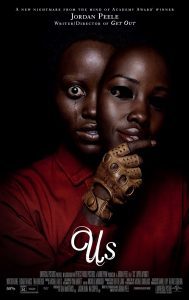
Director Jordan Peele’s richly layered, deftly nuanced smart horror offering tells a tale that can be viewed both individually and collectively, one that gives the audience much to think about upon leaving the theater. The filmmaker’s second feature defies the sophomore jinx, delivering an expertly crafted allegorical story that’s captivating and insightful while dishing out great laughs and a few good scares without becoming gratuitous. Peele has taken a quantum leap in his artistry and storytelling skills with this release, an accomplishment that will likely allow him to write his own ticket from here on out. I can’t wait to see it again! Sadly, though, the picture has come up short during awards season. Despite winning the Critics Choice Award for best horror/sci-fi film and a handful of other nominations, including a Screen Actors Guild Award nomination for best female lead for Lupita Nyong’o, the picture has been otherwise snubbed in other competitions, a true shame to be sure. Perhaps this one hits a little too close to home – a sure sign of its impact and effectiveness.
“Parasite” (“Gisaengchung”)
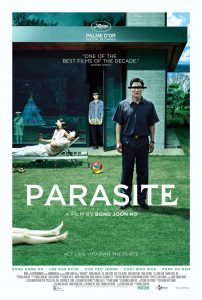
Dissecting the struggle between the classes through the lens of innate human nature – regardless of class status – provides the foundation for this rip-roaring black comedy/social satire, one of those rare films that grabs your attention and relentlessly holds it hostage without letting go. Building on themes explored in such previous works as “Snowpiercer” (2013), writer-director Bong Joon Ho serves up a riveting, ruthless offering that makes its point clearly but without being heavy-handed or cartoonishly over the top. In doing so, the filmmaker expertly dishes out a wealth of utterly hilarious humor about subjects that ultimately prove to be no laughing matter. Easily the year’s best and sufficiently award-worthy for its superb writing and excellent ensemble cast, “Parasite” has been lavishly praised with numerous nominations (including six Oscar nods), as well as best director honors at the Critics Choice Awards, best foreign language film accolades in the Golden Globe and CCA contests, and best picture at the Cannes Film Festival. But, most of all, this is a movie that gives us a lot to think about, a message we had all better take seriously.
HONORABLE MENTIONS
(tie) “Official Secrets”
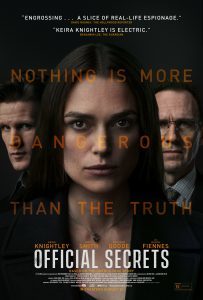
This somewhat rote but nevertheless compelling biopic tells the story of British whistleblower Katharine Gun and how she exposed government efforts to strong-arm United Nations Security Council members into sanctioning the 2003 Iraq War based on faulty intelligence, only to subsequently face prosecution (not to mention harassment) under the UK’s Official Secrets Act. It’s a story not well known outside the UK and one with a message that we should all take to heart. Keira Knightley delivers a knock-out performance as the unlikely and unwitting heroine, backed by a superb supporting cast and the fine direction of filmmaker Gavin Hood. Like the story it’s based on, this film hasn’t received much attention, but it’s definitely a worthwhile view.
(tie) “Knives and Skin” (Full review to come)

Although somewhat meandering at times, this refreshingly experimental, eloquently metaphorical, profoundly poetic look at the joys and challenges of coming of age in a pervasively dysfunctional world offers a truly original story unlike anything most viewers have probably ever seen. With nods to the likes of David Lynch, Paul Thomas Anderson and others, director Jennifer Reeder serves up a frequently absurd, frequently hilarious, but sincerely heartfelt tale about a community of lost souls seeking to find their way with virtually no guidance to help show them the way, save for hard-fought looks within that gradually help them get a grip on their lives and futures. Exquisitely shot with inventive lighting, striking cinematography, and a production design lavishly peppered with neon and pastels, these elements perfectly complement its inspired script and an atmospheric soundtrack that consists mostly of beautifully performed choral versions of pop songs. This one isn’t for everyone, but it surely gives everybody much to ponder – and an undeniable desire to want to watch it multiple times.
“Spider” (“Araña”) (Full review to come)

When a believed-dead right-wing Chilean nationalist reappears decades after working with the radical Fatherland and Liberty movement to overthrow the Communist government of President Salvadore Allende, old ghosts from the past re-emerge from the woodwork, circumstances that create havoc for the story’s principals, both personally and publicly. Told through a series of flashbacks seamlessly woven into the present-day narrative, the film reveals a complex political struggle that spills over from the day’s public events and into the personal lives of the movement’s participants (and vice versa), both in the past and the present. Director Andrés Wood delivers an engaging, edge-of-your-seat thriller with both personal and public implications, as well as a message that’s just as important for today as it was in the past, and not just in Chile. “Spider,” a nominee for the Chicago Film Festival’s Gold Hugo Award, the event’s highest honor, is yet another excellent example of the work coming out of one of the world’s foremost emerging film industries.
“Dark Waters”
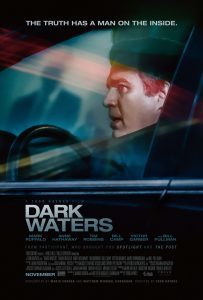
Despite occasional tendencies toward being formulaic, director Todd Haynes’s fact-based thriller explores the efforts of a determined community, led by a courageous and ethical attorney, to take on a major chemical corporation hiding the dangers of its products and all of the fallout that comes with it. The film’s excellent no-nonsense script does a fine job explaining the complex litigious questions involved, detailing the implications of the crusaders’ actions without resorting to jargon or unfathomable legalese. Then there are the superb performances of Mark Ruffalo as the heroic lawyer and Bill Camp as his outraged and victimized client, performances deserving of more attention than they received. This is an important story, one that’s well told and doesn’t hold anything back, a tale that should inspire us all to taking action when it comes to tragedies such as this.
“Babyteeth” (Full review to come)

The seemingly unlikely romance between a seriously ill teenager and a junkie/small-time drug dealer outrages her parents, despite the fact that mom and dad each engage in their own bad behavior and have more than their own share of issues. Yet, as this story plays out, it becomes apparent that those who are supposed to provide guidance can learn much from those they’re guiding. With a tautly written script, a superb ensemble cast (especially Ben Mendelsohn in one of his best performances), creative cinematography and a more than ample supply of quirky humor, this excellent debut feature from director Shannon Murphy ushers the audience through a minefield of emotions (especially in the film’s concluding sequence), leaving viewers moved – and drained – by picture’s end. Think of this as a slightly off-the-wall, bittersweet and decidedly more dysfunctional version of “Terms of Endearment” (1983), and you have the idea. This is a superb offering from a promising new talent. Don’t miss it.
“An Acceptable Loss”
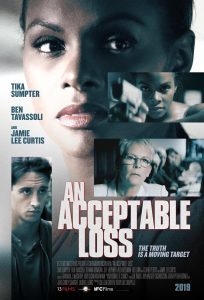
Wow, did the critics ever get this one wrong. This taut, engaging political thriller effectively builds suspense in a Polanski-esque way with a mesmerizing story that delivers clues to its true nature in carefully measured doses, leading up to revelations and a climax that will blow viewers away. Jamie Lee Curtis delivers what is arguably the best performance of her career as a chilling composite of several well-known political figures, along with a solid lead portrayal by Tika Sumpter. See this one – it has much to say (and important stuff at that).
NOTEWORTHY (IN ALPHABETICAL ORDER)
“A Beautiful Day in the Neighborhood”
This heartwarming tale of redemption and forgiveness showcases the efforts of mild-mannered children’s TV icon Fred Rogers when he intervenes to help heal the anguish plaguing a hard-nosed investigative reporter and his estranged father. Oscar, Golden Globe and Screen Actors Guild Award nominee Tom Hanks delivers an outstanding, exceedingly reverent portrayal of the legendary and unlikely television star, as does Chris Cooper as the long-absent and now-penitent father figure. Director Marielle Heller serves up a touching yarn whose innate predictability is creatively offset by a variety of inventive cinematic techniques and clever storytelling techniques. The picture could have used a stronger male lead than Matthew Rhys, and the back story of the protagonist’s conflict could have been fleshed out a little more effectively, but the film otherwise comes through with a soothing quality that the world could use more of these days.
“A Hidden Life” (Full review to come)
While writer-director Terrence Malick’s stream of consciousness style of filmmaking may not be for everyone, he certainly offers his best example of this kind of work in his latest offering, “A Hidden Life.” As with nearly all of his pictures (which are known for including beautiful imagery for its own sake and not necessarily as a means for moving the story forward), this release could definitely use some editing, considering its nearly three-hour runtime. However, given that this fact-based film features a more narrative-driven focus than some of his other works, that change, coupled with his signature style, make for a moving combination, one that’s simultaneously emotionally stirring and beautiful to look at. August Diehl and Valerie Pachner give quietly impassioned performances as protagonists wrestling with crises of conscience in World War II Austria, set against the beauty of their native countryside and the ugliness of Adolf Hitler’s Nazi regime. Admittedly, this picture may try the patience of even the most diehard moviegoer, but it’s worth sitting through even the slow passages given the rewards on offer.
Reviews of this explosive exposé of the pathological sexual harassment Fox News head Roger Ailes inflicted on his female employees have run the gamut from highly praiseworthy for taking on such a sensitive subject to utterly disappointing that it “doesn’t do more” in exploring the roots of its underlying issue. This is a conundrum I find hard to fathom. For the most part, I found this a worthwhile offering, presenting a probing look at a troubling story that effectively mixes cynicism, satire and serious drama in examining a serious workplace matter that often isn’t taken seriously enough. The film’s superb ensemble cast features excellent performances across the board from Charlize Theron, Nicole Kidman and Margot Robbie (all of them Oscar and/or Golden Globe nominees), as well as supporting players John Lithgow, Allison Janney and Malcolm McDowell, combined with an inventive storytelling approach that keeps the picture fresh and engaging throughout. Frankly, I don’t understand what disappointed viewers expected out of this release, but I find their criticisms misplaced that “Bombshell” somehow should have handled its material in a way that it wasn’t intended to be handled in the first place, an unfair disparagement if you ask me – and one this film doesn’t deserve.
Hands down, this is the best superhero movie I’ve seen in quite some time – well written and well acted, with no overreliance on action or special effects gimmickry to carry the story. Brie Larson seamlessly steps into the role of superhero, capably supported by a cast of colorful supporting players who add humor, intrigue and warmth to a well-constructed narrative. Honestly, I don’t care how well or how poorly this offering fits into the larger Marvel Universe mythology or the overall marketing strategy of the franchise; I judge a film on its individual merits, and, on this score, this picture succeeds well on every front. “Captain Marvel” does what a superhero movie should – entertain, inspire and leave viewers feeling as though they’ve gotten their money’s worth from the theatrical experience.
This surprisingly good offering about a successful child star and his troubled father who uses tough love (sometimes a little too tough) to see his son succeed and avoid the mistakes he made in his life presents a story based on the life experience of writer-actor Shia LaBeouf and his own dad. Told through flashbacks, viewers see how a now-adult movie star dogged by substance abuse goes through rehab to deal with his past and seek resolution, a tale peppered with unusual and unexpected ups and downs, as well as a revelation that situations like this aren’t necessarily black and white. Excellent performances abound, especially LaBeouf’s portrayal of the father figure and by Lucas Hedges and Noah Jupe as the elder and younger actor. Inventive cinematography and creative musical montages help to set this one apart from other similar releases, evoking heartfelt but not manipulative emotional responses and earning the picture four Independent Spirit Award nominations. Think of this as a grittier, gender-switch, working class version of “Postcards from the Edge” (1990), and you’ve got the idea what’s behind this one.
Doing justice to an iconic performer can be a tricky proposition, but “Judy” does just that where legendary singer/dancer/actress Judy Garland is concerned. Golden Globe and Critics Choice Award winner Renée Zellweger absolutely knocks it out of the park in a touching, brings-tears-to-your-eyes, Oscar-nominated portrayal of the talented but tragic performer. While some elements might have been handled a little better (such as the pacing in the first 30 minutes), the film more than makes up for any minor shortcomings with Zellweger’s phenomenal singing and acting, capturing Judy’s sensitive but sad essence with gripping emotion and a superb rendition of her subject’s character. It may not be a perfect movie, but it absolutely gets it right where it counts.
“Just Mercy” (Full review to come)
Despite some occasional pacing issues and a storytelling approach that’s fairly conventional for films of this type, “Just Mercy” nevertheless reaches out and grabs viewers with an intensity that earns the genuinely sincere emotions it evokes from audiences. With fine performances by Michael B. Jordan and Screen Actors Guild Award nominee Jamie Foxx, this fact-based story of an idealistic lawyer’s efforts to exonerate an innocent African-American man on death row in Alabama touches in ways that movies of this stripe typically don’t despite similarity in subject matter and narrative. One would think in this day and age that we shouldn’t have to be shown films that embody stories such as this, but, given the prevailing conditions found in our ever-increasingly polarized society, it’s obvious the need is still there, and, thankfully, we have pictures like this to step up and fill that void.
What a treat it is to see a smartly written, intelligent, genuinely funny comedy these days, one that isn’t afraid to poke some major holes in the types of vehicles that claim to be funny but truly aren’t. While the film could use a little more development in certain parts of the back story, and while some elements are a little too predictable, this otherwise-spot-on tale delivers huge, often-scathing laughs and does so without necessarily having to rely only on one-liners. Mindy Kaling, John Lithgow and, especially, Emma Thompson turn in fine performances in a story that plays like “The Devil Wears Prada” (2006) set in the world of the TV comedy biz. And, by the way, pay no attention to the trailer for this one – it really doesn’t do the film justice.
“Richard Jewell”
This suspenseful, well-acted, well-directed biopic of an innocent man accused of a heinous crime at the 1996 Atlanta Olympics hits most of the right notes save for one very big one – the truth of how the reporter who broke the story actually got her information. This controversial story thread, which has drawn angry criticism from those who knew the journalist in question, seems to linger somewhere between possible truth and outright fiction, an element that undermines an otherwise-fine film, particularly the point about character assassination that it’s trying to make. However, even if this aspect of the film is a glaring error, there’s still plenty to like about director Clint Eastwood’s work, especially the excellent performances of its superb ensemble, including Paul Walter Hauser, Sam Rockwell, Jon Hamm, Olivia Wilde, and Oscar and Golden Globe Award nominee Kathy Bates, recipient of the National Board of Review’s award for best supporting actress. Granted, this one may have to be taken with a hefty grain of salt, but the picture’s many strengths more than outweigh its very large shortcoming, which, had it been handled differently, would have made this an otherwise truly great film.
Despite some occasionally sluggish pacing and a narrative that’s more than a little predictable, this modern-day retelling of Huckleberry Finn is one of the sweetest, most heartfelt feel good comedy-drama-road trip offerings to come along in years. Shia LaBeouf and Dakota Johnson turn in some of their best work here, along with fine performances by newcomer Zack Gottsagen and veterans Bruce Dern and Thomas Haden Church. This may not be epic cinema, but it’s certainly satisfying, well-crafted, crowd-pleasing entertainment.
WORST FILMS
“Lucy in the Sky”
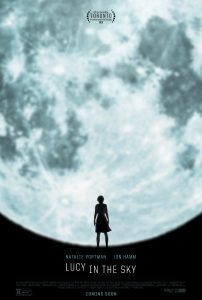
What starts out as a promising tale of personal discovery regrettably turns hard to believe, almost campy, in the second half. Despite the film’s fact-based nature, its story line degenerates into an overwritten, overacted debacle that almost becomes laughable at times, the otherwise-fine performance of Natalie Portman notwithstanding. It’s truly a missed opportunity to tell a story with some depth and meaning in an unlikely setting.
“Transit”
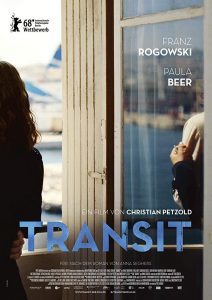
Director Christian Petzold’s meandering, pretentious, inarticulate screen adaptation of Anna Seghers’s novel is a mess almost from the outset. This tale of refugees trapped in Marseilles trying to flee the Nazi occupation of France retells this historic saga in a contemporary time frame, a half-baked attempt at commenting on Germany having to come to terms with its past while simultaneously speaking to the current European refugee crisis. One could say that it’s attempting to be “Casablanca” (1942) for the 21st Century. Unfortunately, the film’s convoluted mishmash of plot lines and undeveloped characters is presented with virtually no back story, jumping into its narrative without any context, meaningful character identification or hints about the confusingly anachronistic elements intertwined here. All in all, a poorly conceived offering feebly attempting to pass itself off as lofty arthouse cinema. Skip it.
“Captive State”
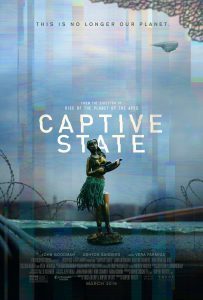
This well-intentioned but regrettably poorly constructed alien invasion story is riddled with relevant but all too obvious and heavy-handed sociopolitical symbolism. In a film that’s part “War of the Worlds” (2005), part “District 9” (2009) and part “Divergent” (2014), along with other all-too-familiar sci-fi allusions thrown in, viewers are handed a story that’s a little too crammed with ideas, characters, technologies and events to adequately keep track of things given the blistering pace of the story (a quality that, ironically, makes the picture somewhat tedious to watch). This could have been a lot better with some retooling – and maybe a few more drafts of the screenplay.
“Ad Astra”
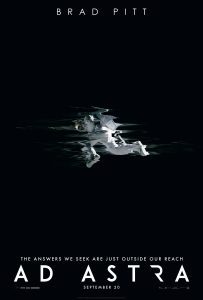
This amalgamation of half-baked, underdeveloped, disjointed scientific and philosophical notions translates into a film whose narrative has more plot holes than a wheel of Swiss cheese. The lackluster, deadpan dramatic performance of Brad Pitt (who really should stick to comedy), combined with sluggish pacing, underwhelming special effects and a poorly written, poorly executed script, leave viewers wanting for much more than what this package delivers. What’s worse, though, is that there were ample opportunities to salvage this story and to take it in surprising, refreshing and enlightening directions that would have made for a much, much better picture. Pay no heed to the critics on this one; all hype aside, it’s a major disappointment and far from the epic masterpiece status that has been so undeservedly lavished upon it.
“Being Frank”
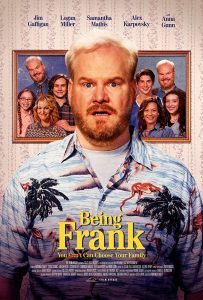
Despite a fine lead performance by Jim Gaffigan, this dark comedy about the misadventures of a philandering middle-aged dad with two families often falls flat thanks to a screenplay that misses opportunities for wicked laughs, attempts to make light of situations that aren’t funny and tries too hard to generate sympathy for a protagonist undeserving of it. What’s more, the film at times verges on becoming too complicated for its own good, mistakenly confusing excessive complexity with screwball pacing. This picture’s premise had a lot of potential but, regrettably, just can’t pull it off successfully.
“Midsommar”

Although beautifully filmed and chock full of surprisingly grabbing humor, this meandering, overlong, frequently predictable smart horror offering tries the viewer’s patience early on in the first act, a shortcoming that relentlessly carries through to the end. While presented as a story about psychological health and well-being painted on the canvas of an allegedly suspenseful thriller, the picture comes up woefully short in the fright department (even though it tries to compensate for that with ample gratuitous gore), largely because, at a 2:20 runtime, it takes far too long to reach its final destination (which is easily visible from miles away). Florence Pugh’s often-overwrought performance becomes tiresome, almost laughable, as the story wears on…and on…and on as it inches toward its wholly unfulfilling conclusion. Save your money.
“Doctor Sleep”
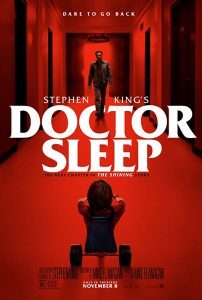
This jumbled, overlong, often-boring, frequently silly sequel to the Stanley Kubrick horror classic “The Shining” (1980) misfires so much and so often that it’s an utter embarrassment to all involved. With a painfully protracted runtime of 2:32 and a storytelling approach that inexplicably vacillates between campy romp and trite horror fare, filmmaker Mike Flanagan’s directorial skills simply aren’t up to paying homage to the artistry of the predecessor picture’s creator, especially in one particularly grotesque sequence that’s in stupendously bad taste. Moreover, the writing and acting are frequently comical, so horrendously awful that I often found myself chuckling over material that I probably wasn’t supposed to be laughing at. You know you’ve got a stinker on your hands when you see, as I did at my screening, viewers getting up and leaving not even halfway into the movie. Here’s hoping Stanley wasn’t watching.
“The Souvenir”
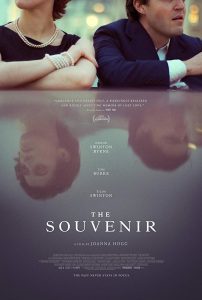
Handily one of the most empty, tedious and flat-out dull movie experiences I’ve had in quite a long, long while, this English romantic drama about the perils of toxic relationships satisfies about as much as a brew made from yesterday’s leftover teabag. This story (if one can even call it that) never gets off the ground but instead wallows in a collection of disjointed incidents mixed in with pseudointellectual discussions about filmmaking and other obscure, esoteric topics. For the life of me I have no clue what director Joanna Hogg was going for here, and, based on the results, I suspect she didn’t, either.
“Once Upon a Time…in Hollywood”
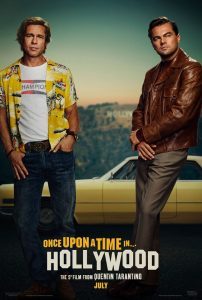
When this film was initially released, my gut instincts told me not to waste my time. However, with all of the awards buzz swirling around it (including 10 Oscar nominations, four SAG Award nominations, three Golden Globe wins and four Critics Choice awards), I decided to give it a look, after which I realized my initial reaction was right: Absolute utter garbage, overrated in virtually every respect (except, perhaps, for Leonardo DiCaprio’s fine Oscar-nominated lead performance). What praise is there to be given for two dragged-out hours of boring, mundane activity, followed by a gratuitously grotesque conclusion that’s supposed to be…funny? My only takeaway from this is that director Quentin Tarantino may be a master of nostalgia in his authentic re-creation of past pop culture but little else, an accomplishment that, frankly, makes me wonder, “Who cares?” The director has hinted that his next picture will be his last; let’s hope he keeps his word.
“John Wick: Chapter 3 – Parabellum”

If “pornography” is accurately defined as “having no redeeming social value,” then this positively repugnant release would most certainly qualify on that score. The film’s simplistic, virtually nonexistent plot, endless fight sequences that quickly become repetitive and boring, excessively wanton violence, and monotone acting by the protagonist combine to transform what should have been a compelling action thriller into a tasteless snooze that had me checking my watch more than a few times. With the exception of a few intriguing supporting performances and the occasional infusion of humor, this one has nothing (and I do mean nothing) else to offer. Many dissenting critics have said this plays like a video game version of the franchise, which seems like an all-too-fitting description. Unless you have a fetish for leering over senseless, recurring, brutal violence run amok, steer clear of this one.
DISHONORABLE MENTIONS
(tie) “Gloria Bell”
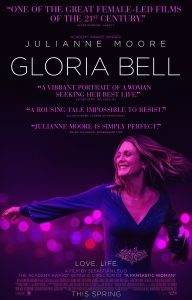
An eclectic collection of singular moments and notions worth pondering, unfortunately, is not enough to make a story, the principal downfall of this ultimately tiresome offering, a sort of present-day remake of “An Unmarried Woman” (1978). I kept waiting…and waiting…and waiting for the dots of this story to connect, but they never really do except in the vaguest of ways, making for an experience almost as unsatisfying as that of the life of the protagonist. Julianne Moore’s earnest though somewhat overrated performance helps to maintain a modicum of interest, but it’s not enough to save a picture that’s desperately searching to validate its existence, a truly disappointing effort from acclaimed director Sebastián Lelio.
(tie) “The Last Black Man in San Francisco”
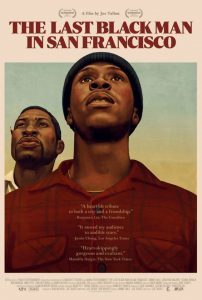
I suppose there’s a good story hidden somewhere in this film, but it never surfaces. And the picture’s reliance on gorgeous cinematography of a beautiful city, along with some capable acting, are far from enough to save this cluttered, unfocused mess. Perhaps the biggest issue is that the film tries to cover too much ground and doesn’t do most of its many, many, many themes justice as a result. From gentrification to white privilege to black-on-black violence to busting the balloons of unrealistic pipe dreams, the film raises more questions than it answers or fleshes out. “Last Black Man” may be pretty to look at, but it clearly needed a few more rounds of script review to pull off whatever it was attempting to do.
“High Life”

This meandering, convoluted attempt at merging space-based sci-fi, edgy eroticism and the fallout of a dystopian existence never finds its legs, leaving viewers scratching their heads more often than not. Poor sound quality, cheap-looking sets and an inexplicably nonlinear script don’t help matters as the characters and the story hopelessly seek to find themselves. The hype here is definitely ill-deserved, and protagonist Robert Pattinson definitely needs to pick better scripts.
“The Dead Don’t Die”
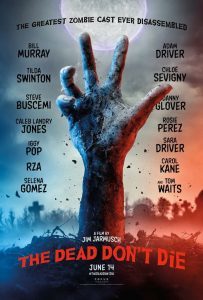
The filmography of director Jim Jarmusch is characterized by hits and misses. Unfortunately, his latest offering is more the latter than the former. This social/political satire, wrapped up in an homage to George Romero’s horror classic “Night of the Living Dead” (1968), frequently falls flat, playing like an unedited first cut of an unedited first draft screenplay. Jarmusch’s latest seems like an attempt to imitate the work of Jordan Peele, but it lacks the airtight narrative foundation to effectively pull it off. That’s too bad, too, given the stellar cast here, most of whom (except for Tilda Swinton) are underutilized and given precious little to work with. What’s more, the story takes far too long to find traction, something that it finally starts to do in the second half but never quite catches fire due to some of the same pacing, editing and lackluster writing issues that plague the entire first half. With what Jarmusch had to work with, this is a very big missed opportunity indeed.
“Greta”
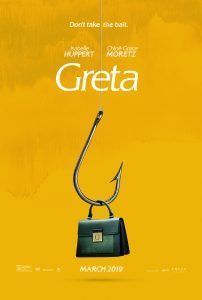
Is it a psychological thriller? A campy romp? Well, that’s what the film itself is unable to decide. While it does each of those things well, it doesn’t effectively mesh them together, abruptly switching gears from the former into the latter in the final act. Had director Neil Jordan decided which of these approaches he wanted to use, he would have had a much better picture on his hands. Alas, though, viewers are left with a film that’s almost as schizophrenic as one of its two principals. Despite these issues, one can’t help but commend Isabelle Huppert for her moxie in being willing to yet again take on a part where she’s willing to do anything (and do it well). It’s too bad, though, that she didn’t have a better vehicle to show off what she can really do.
“Monos”

Despite excellent cinematography and fine film editing, this would-be epic saga of a group of adolescent rebel commandos harboring an American hostage in the mountains and jungles of Latin America aspires to heights of profundity that it never quite attains. With an almost complete lack of back story, an episodic, meandering narrative, and unresolved plot lines at movie’s end, this film seems to strive at making a statement it can never articulate. This is yet another case of hype trying to outmuscle quality and failing miserably.
Copyright © 2019-20, by Brent Marchant. All rights reserved.
The post The Best – and Worst – of 2019 appeared first on Brent Marchant.
January 6, 2020
Tune in for The Cinema Scribe
Tune in for the latest Cinema Scribe segment on Bring Me 2 Life Radio, Tuesday, January 7, at 2 pm ET, by clicking here. And, if you don’t hear it live, catch it later on demand!


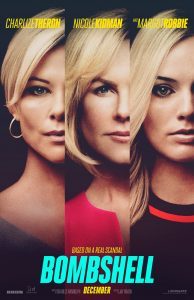
The post Tune in for The Cinema Scribe appeared first on Brent Marchant.
January 5, 2020
This Week in Movies with Meaning
Reviews of “Dark Waters,” “Marriage Story” and “Bombshell” are all in the latest Movies with Meaning post on the web site of The Good Media Network, available by clicking here.




The post This Week in Movies with Meaning appeared first on Brent Marchant.
‘Bombshell’ tests our resolve for the truth
“Bombshell” (2019). Cast: Charlize Theron, Nicole Kidman, Margot Robbie, John Lithgow, Allison Janney, Malcolm McDowell, Kate McKinnon, Connie Britton, Mark Duplass, Mark Moses, Ben Lawson, Josh Lawson, Alanna Ubach, Kevin Dorff, Anne Ramsay, Jennifer Morrison, Liv Hewson, Rob Delaney, Amy Landecker, Nazanin Boniadi, Richard Kind, Holland Taylor. Archives: Donald Trump. Director: Jay Roach. Screenplay: Charles Randolph. Web site. Trailer.
When patently unfair circumstances arise, many of us have a natural tendency to want to make them known, exposing the perpetrators for their misdeeds. But, when extenuating conditions – particularly those that could significantly impact us personally – intrude upon our willingness to step forward, we may find ourselves putting on the brakes when we don’t want to. Resolving such quandaries can often prove difficult, especially when we stand a lot to lose. So it is for a trio of dedicated, hard-working journalists who find themselves unduly imposed upon in the new fact-based drama, “Bombshell.”
Over the course of two decades, television executive Roger Ailes (John Lithgow) built the Fox News channel into cable TV’s most successful news outlet. By 2016, Ailes helped make it the most profitable property of its parent media organization, News Corp, much to the delight of the conglomerate’s CEO, Rupert Murdoch (Malcolm McDowell). And he did it by targeting a particular underserved audience – one closely resembling his own sensibilities – and getting the most out of his fanatically loyal (though some might say rigidly coerced) team of employees. Regardless of what one might have thought about the channel’s politics, policies, practices and pundits, Fox News was undoubtedly a success story – and an immense cash cow.
So what was that underserved audience that Ailes courted? It was the conservative right wing of the American political landscape, a constituency that was mostly White, male and “traditional” in its prevailing outlooks. Ailes skillfully amassed a staff of on-air talent and producers who knew how to appeal to that audience. And, to secure the loyalty of the network’s core viewers, Ailes assembled a team of beautiful, leggy female anchors and correspondents, a veritable palette of stunningly gorgeous, mostly blonde eye candy sure to appeal to those who liked a little voyeurism with their news. Critics of this approach to team building were quick to call it sexist, accusations that Ailes handily brushed aside by glibly observing that “television is a visual medium.”
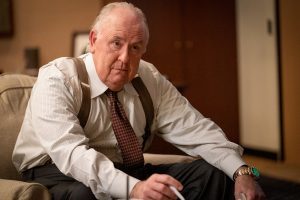
Roger Ailes (John Lithgow), head of Fox News, watches his career evaporate before his eyes as devastating allegations of sexual harassment emerge in “Bombshell.” Photo by Hilary Bronwyn Gayle SMPSP, courtesy of Lionsgate.
Regardless of Ailes’s tactics, one couldn’t deny his success. Some might even say that his tightly focused, specifically targeted plan for reaching his core audience was brilliant, effectively tapping into and capturing the attention of the viewership he was seeking to land. However, considering the specific practices Ailes used in achieving his goals – especially where recruiting on-air talent was concerned – any praise he might have received was instantly called into question. The reason: Ailes assembled much of his team through sexual innuendo and coercion, swapping career opportunities and promotions for “favors” characterized by leering looks, salacious comments and bald-faced propositions for acts of sexual submission. Despite his professed claims in support of journalistic integrity and broadcast professionalism, the cheesecake factor frequently figured into his plans. And, with the ever-looming threat of retaliation or dismissal for noncompliance or disloyalty hanging in the balance, those who didn’t bow to Roger’s wishes could face serious consequences if they didn’t play ball.
However, over time, word of Ailes’s sexual harassment began leaking throughout the organization. Previously silent employees began tentatively speaking to one another, comparing notes about their own experiences or sharing stories that they had heard about peers. This became obvious when certain developments emerged, such as undeniable demotions for those who failed to cooperate with Roger’s wishes, either in disagreements with his editorial viewpoints or rebuffs to his sexual advances. An organization long kept in line by its head’s unbridled manipulative practices was at last beginning to crack.
“Bombshell” tells this story through the personal experiences of three Fox staffers: Megyn Kelly (Charlize Theron), one of the channel’s biggest on-air assets, who had been harassed at one time but who was reluctant to step forward to publicly criticize her boss years after the fact, given the successful career she had built for herself; Gretchen Carlson (Nicole Kidman), a onetime Fox success story who had been systemically demoted for her “divergent” on-air views and her resistance to Ailes’s advances, some of which she secretly recorded without his knowledge; and Kayla Pospisil (Margot Robbie), a composite fictional character said to be based on several Fox employees whose enthusiasm to move up through the ranks soon brought her face to face with the way things really worked in Roger’s organization. Through their interwoven stories and the characters’ ongoing interactions with Ailes, viewers see how the organization’s dirty little secret mushroomed into a major scandal that brought swift action at Fox News and increased public attention to the issue of sexual harassment in the workplace.
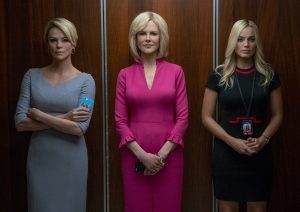
Fox News staffers Megyn Kelly (Charlize Theron, left), Gretchen Carlson (Nicole Kidman, center) and Kayla Pospisil (Margot Robbie, right) face career challenges related to sexual harassment in director Jay Roach’s “Bombshell.” Photo by Hilary Bronwyn Gayle SMPSP, courtesy of Lionsgate.
When faced with the kinds of difficulties present here, those affected faced some hard choices. Do they blow the whistle on someone who was using his power to try to control their destinies? Or do they keep quiet to preserve what they’ve attained? With so much on the line, the decisions they made invariably came down to what they believed was more important. And that, in turn, impacted what materialized in their lives, as beliefs are the cornerstone of the conscious creation process, the philosophy that maintains these intentions control what manifests in the world around us.
In making these decisions, the harassment victims needed to establish their priorities, a process that’s more difficult than one might think. Outsiders, for instance, might have easily said that no self-respecting individual should have to put up with the kind of abuse to which they were subjected. However, when faced with the loss of one’s livelihood, as well as the likelihood that one’s journalism career would be over (those who left Fox were seldom taken seriously as job candidates by other news organizations), victims had to think twice about making waves. This was especially true in light of “The Black Room,” a clandestine rogue operation run by Ailes to spy on journalists, including, allegedly, those who worked for Fox who were suspected of the kind of disloyalty the big boss so detested.
Thus, with all of this pressure in place, speaking up was risky business. Even if someone worked up the gumption to take on the organization, Ailes made it difficult to challenge the machine by structuring employment contracts with clauses requiring grievances against Fox to be settled through arbitration, not litigation. The only way to get at him was to sue him personally, a steep hill to climb without proof. Fortunately, though, one victim thought ahead when it came to that front, compiling the evidence to make such a lawsuit possible.
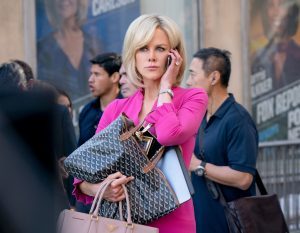
Demoted Fox News anchor Gretchen Carlson (Nicole Kidman) plans her strategy to seek restitution against her retaliatory boss in “Bombshell.” Photo by Hilary Bronwyn Gayle SMPSP, courtesy of Lionsgate.
This innovative strategy illustrates that, in the end, nothing is impossible without a little ingenuity, an outcome made possible by using conscious creation to break through perceived limitations. By coming up with beliefs to establish inventive approaches to seemingly insurmountable problems, we can indeed overcome even the most formidable obstacles – even the kind erected by Roger Ailes himself.
In addition to matters of personal well-being, the priority sorting process involved other less tangible (but nonetheless significant) considerations. As noted previously, Ailes demanded loyalty from his employees, and, for those who gave it, he rewarded them handsomely. In many cases, this led to the development of a strong sense of allegiance, often despite his transgressions. Some Fox staffers found it difficult to abandon such attitudes, afraid that their actions would constitute personal betrayals that they were unwilling to make. This became especially apparent when allegations against Ailes began circulating widely, prompting his most devoted in-house supporters to come up with a “Team Roger” campaign in which they staunchly urged co-workers to wear tee shirts bearing that slogan.
However, as the degree of accusations exploded, these newly developing circumstances made it increasingly difficult for even the most dedicated employees to stay silent. As time passed, prevailing conditions made it easy to alter the underlying beliefs behind these positions. Again, conscious creation finds a way when there’s a will to drive it.
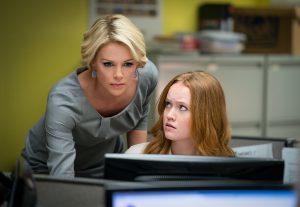
Fox News anchor Megyn Kelly (Charlize Theron, left) and staff aide Lily Balin (Liv Hewson, right) consider their options as news of sexual harassment allegations against their boss explode in the new historical drama, “Bombshell.” Photo by Hilary Bronwyn Gayle SMPSP, courtesy of Lionsgate.
Of course, not everyone’s view is capable of being easily changed. As the film illustrates, Roger’s wife, Beth (Connie Britton), and his lawyer, Susan Estrich (Allison Janney), are reluctant to agree with the charges leveled against him. Beth, in fact, tries to brush them off by suggesting that her husband’s lewd comments are nothing more than a reflection of his “salty” sense of humor. Such blind obedience, both on her part and even that of some Fox staffers, illustrates how stubbornly persistent beliefs can be, something that can prove devastatingly disillusioning in the long run.
What’s most inspiring in this story, though, is the willingness of the victims to ultimately step forward. They may have operated largely independent of one another, but their collective, co-created effort had a tremendous cumulative impact. Their efforts effectively challenged the position of someone who thought he was untouchable. They collectively helped foster change within an organization where sexual harassment was not accorded the seriousness it deserved (especially since it eventually reared its ugly head with individuals other than just Ailes). And they helped bring new awareness to the problem in workplace culture throughout America, not just within the ranks of Fox News.
The outcomes obtained by these courageous individuals reflect their resolve to live out their value fulfillment, the conscious creation concept associated with being our best, truest selves for the betterment of ourselves and those around us. Despite the difficulties they may have experienced along the way, the efforts they expended to achieve change were worth it in the end. It was their destiny to do what they did, and, fortunately, they formulated and implemented the beliefs they needed both individually and collectively to achieve the results they sought. Talk about fair and balanced.
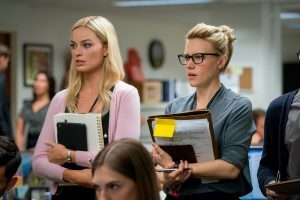
Aspiring Fox News journalist Kayla Pospisil (Margot Robbie, left) and colleague Jess Carr (Kate McKinnon, right) wonder what the future holds as allegations of sexual harassment by their organization’s boss explode in the new historical drama, “Bombshell.” Photo by Hilary Bronwyn Gayle SMPSP, courtesy of Lionsgate.
Reviews of this explosive exposé have run the gamut from highly praiseworthy for taking on such a sensitive subject to utterly disappointing that it doesn’t “do more” in exploring the roots of its underlying issue. This is a conundrum I find hard to fathom. Frankly, I don’t understand what disappointed viewers expected out of this release, but I find their criticisms misplaced. The picture tells a specific story; it’s not an overview treatise on the subject matter. Thus the suggestion that “Bombshell” should have somehow addressed this material in a way that it wasn’t intended to be handled in the first place is an unfair disparagement – and one this film doesn’t deserve.
For the most part, I found director Jay Roach’s latest to be a worthwhile offering, serving up a probing look at a troubling story that effectively mixes cynicism, satire and serious drama in examining a troubling workplace issue. The film’s superb ensemble cast features excellent performances across the board from Theron, Kidman, Robbie, Lithgow, Janney and McDowell, and its inventive storytelling approaches – though at times a little gimmicky – generally keep the picture fresh and engaging throughout.
“Bombshell” has been lavishly honored with awards season nominations, especially in the acting categories. For her efforts, Theron has earned Golden Globe, Screen Actors Guild and Critics Choice Award nominations in the lead actress categories, while Robbie has received comparable honors in the supporting categories. Kidman, meanwhile, has picked up a supporting actress nod of her own in the SAG Award competition. In addition, the film’s ensemble has received nominations in the SAG and Critics Choice Award contests, as well as a CCA nod for best hair and makeup.

In this day and age, it’s hard to believe that victims still have to contend with an issue like this. Cases have been successfully brought against offenders for decades, so it’s not like the consequences of these actions are unknown or anything new. And yet there are still culprits out there who believe they can get away with such actions. Fortunately, there are courageous souls out there who are willing to step up and challenge the guilty parties – and, thankfully, their fearless, intrepid efforts can prove to be powerful bombshells in themselves.
Copyright © 2019-20, by Brent Marchant. All rights reserved.
The post ‘Bombshell’ tests our resolve for the truth appeared first on Brent Marchant.
December 31, 2019
‘Dark Waters’ pushes us to test – and surpass – our limits
“Dark Waters” (2019). Cast: Mark Ruffalo, Anne Hathaway, Tim Robbins, Bill Camp, Bill Pullman, Mare Winningham, Victor Garber, Louisa Krause, William Jackson Harper, Richard Hagerman, Denise Dal Vera, Scarlett Hicks, Bella Falcone, Jim Azelvandre, Kevin Crowley, Jeffrey Grover, Kelly Mengelkoch, Annie Fitzpatrick, John Newberg. Director: Todd Haynes. Screenplay: Matthew Michael Carnahan and Mario Correa. Story: Nathaniel Rich, “The Lawyer Who Became DuPont’s Worst Nightmare,” The New York Times Magazine, 2016. Web site. Trailer.
At some point in our lives, many of us come face to face with situations where we need to make difficult choices and engage in challenging tasks, simply because they’re the right thing to do. Such efforts may test us severely, pushing us to the brink of – and possibly beyond – what we think we’re capable of. Those can be hard times, for sure, but, when we consider what’s at stake – and what we can gain by willingly choosing to act – we’re likely to see that we must do what we do if we’re to live with ourselves. So it is for a beleaguered protagonist in the new fact-based legal thriller, “Dark Waters.”
Attorney Rob Bilott (Mark Ruffalo) enjoys a comfortable and successful life as a corporate attorney in Cincinnati. He’s made a good career for himself representing companies in the chemical industry, most notably DuPont, one of his firm’s most important clients. In fact, his legal defense work for that organization contributed significantly to him making partner and becoming one of the most trusted advisors to managing partner Tom Terp (Tim Robbins). And, outside of work, Rob is happily married to his wife, Sarah (Anne Hathaway), who gave up her career as a lawyer to become a stay-at-home mother of three. It seems like everything is going his way – that is, until someone walks into his office one day and changes his life forever.
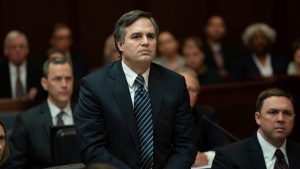
Intrepid attorney Rob Bilott (Mark Ruffalo, center) does an about-face by suing the chemical company giant he once represented in director Todd Haynes’s fact-based legal thriller, “Dark Waters.” Photo by Mary Cybulski, courtesy of Focus Features.
While conferring with his fellow partners, Rob is called out of the meeting when he’s asked for by name by someone he’s never met, West Virginia farmer Wilbur Tennant (Bill Camp). Utterly perplexed, Rob asks Wilbur why he specifically wants to see him, to which the stranger replies that he was recommended by one of Rob’s relatives from back home in Parkersburg, WV, where the attorney spent many of his summers while growing up. When Rob then inquires about the nature of Wilbur’s legal needs, the farmer tells him that contaminants had seeped onto his property and poisoned the drinking water source for his herd of cows, killing 190 of them. Wilbur then points the finger at the culprit he believes is behind this problem – the DuPont organization.
Rob tells Wilbur that, since he represents DuPont, it’s unlikely he’ll be able to help him. But something about Wilbur’s story troubles him, so Rob drives to Parkersburg to investigate further. Upon witnessing the harm inflicted on Wilbur’s farm, he feels compelled to see if there is any way he can help. And so, upon returning to Cincinnati, he consults with his peers to discuss an equitable way to work out the situation between Wilbur and DuPont. Rob approaches DuPont executive Phil Donnelly (Victor Garber) to propose negotiating a settlement arrangement, and the company initially agrees to cooperate. But, before long, matters take a left turn, and the deal is off.
As Rob begins to discover more of what’s really going on in Parkersburg, he sees a bigger problem than just the deaths of Wilbur’s cows. He wants to help those who have been hurt, but he’s also got his obligations to his firm and to DuPont as a client. But, after an anxious discussion with Tom, he persuades the managing partner to back him in his plan to take on the chemical company giant, despite the stakes involved.

West Virginia farmer Wilbur Tennant (Bill Camp, left) seeks to sue chemical giant DuPont after losing 190 cows to contaminated drinking water as seen in the new fact-based drama, “Dark Waters.” Photo by Mary Cybulski, courtesy of Focus Features.
Challenging one of the country’s largest and most beloved companies quickly proves to be a much bigger undertaking than anticipated. Rob becomes buried in piles of discovery materials submitted in hopes that the sheer volume will discourage him in his quest. But he’s not the only one who is taken to task; Wilbur comes under fire, too, as Parkersburg residents shun the man who has decided to threaten the community’s largest employer and the livelihood of its many workers, most of whom would be lost without their jobs at DuPont. Despite those obstacles, though, Rob meticulously reviews the discovery materials, and Wilbur sticks to his guns to proceed, public reaction notwithstanding.
Circumstances quickly escalate for all concerned. The long hours involved in reviewing the discovery materials take a toll on Rob’s physical and emotional well-being, as well as the health of his marriage. But, when Rob meets with a chemical expert (John Newberg) and learns what’s behind the pollution, he’s shocked. He discovers that the drinking water has been contaminated with “forever chemicals” – those that don’t break down in the body and accumulate over time – to such an extent that much of the Parkersburg community – and users of products containing these chemicals outside of the area – could well be affected.
The greatest concern involves a substance known as PFOA-C8, a chemical that goes into making Teflon. The chemical was originally developed to help protect the exteriors of army tanks but was later adapted for consumer product use, most notably in manufacturing nonstick cooking pans. As Rob learns through his discovery review, DuPont’s own studies revealed that the chemical caused cancer in animals and humans and birth defects in the unborn children of women working at the company’s facilities. This discovery led to ongoing monitoring programs on animals and the organization’s employees – and was implemented without saying a word about the danger. With huge volumes of toxic sludge containing the chemical dumped up river from Wilbur’s farm, it’s not hard to see how his cows became sick – or how Wilbur and his wife, Sandra (Denise Dal Vera), subsequently followed suit.
To make matters worse, PFOA is an unregulated substance, one for which there is no government oversight, including the determination of environmental safety levels, thereby muddying the waters about adequate protection and potential liability. How much is too much? Who makes the determination? What constitutes a violation? And what are the penalties for noncompliance?

On his farm outside Parkersburg, WV, farmer Wilbur Tennant (Bill Camp, left) shows attorney Rob Bilott (Mark Ruffalo, right) the extent of the damage done to his property and livestock in “Dark Waters.” Photo by Mary Cybulski, courtesy of Focus Features.
Thus begins a protracted legal battle. DuPont offers to settle with Wilbur, a proposal Rob encourages him to accept, but he refuses, contending that he wants justice more than money. In the wake of this, Rob submits a brief to the Environmental Protection Agency and the Department of Justice that incorporates DuPont’s internal information found during discovery, a move that leads to a sizable fine from the EPA.
However, despite this result, Rob is not satisfied, given that Parkersburg residents will be affected by this problem for the rest of their lives. He subsequently prepares a class action lawsuit when Parkersburg resident Darlene Kiger (Mare Winningham) and her second husband, Joe (Richard Hagerman), come forward with a letter they received from their local water district warning them of the presence of PFOA in their drinking water. Upon receiving this notification, Darlene recalls that her first husband, a DuPont chemist, cautioned her about the dangers of handling his work clothes in light of possible PFOA contamination and the health implications for women and unborn children. Even with taking this precaution, Darlene still needed to undergo an emergency hysterectomy several years later.
This revelation leads to a community-wide medical monitoring program to determine how many Parkersburg residents are affected. The seven-year study, which ends up testing 70,000 people, tries the patience of all concerned, as well as Rob’s own physical health. But, when the results come in, the door to justice opens at last.
Stories like this outrage most of those who hear about them. One wonders how any individual or organization, in all good conscience, could allow circumstances like this to go on for as long as they did. It raises serious questions about priorities. But, to understand the answers to those questions, one needs to look at the underlying beliefs driving them, for they determine the outcome that emerges through the conscious creation process, the philosophy that maintains we harness these powers in manifesting the reality we experience.
In a scenario like this, where profits are placed before people, it’s not difficult to see what beliefs are at work. This is a prime example of the practice of un-conscious creation, where achieving a particular outcome is viewed as paramount, regardless of whatever consequences may accompany it. Even in the most benign of circumstances, this can be a problematic course to follow, for there may be all manner of unintended side effects and fallout. In a situation like this, where the company knowingly engages in this sort of behavior, it’s difficult to believe that it couldn’t envisage the negative consequences, especially after its own studies found them to be occurring. This suggests that the power of the overriding beliefs is so strong that it’s like an unstoppable juggernaut, collateral fallout aside. Of course, when this occurs, there’s usually hell to pay eventually, as DuPont finds out when it’s hauled into court, undoubtedly another side effect that likely was not part of the original intent.
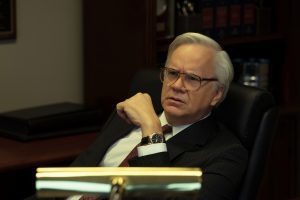
Tom Terp (Tim Robbins), managing partner of a Cincinnati-based corporate law firm that specializes in defending chemical companies, struggles with what to do when one of his organization’s partners wants to sue one of its biggest clients in director Todd Haynes’s “Dark Waters.” Photo by Mary Cybulski, courtesy of Focus Features.
As noble and high-minded as taking on a cause like this might seem, doing so may prove more challenging than anticipated given the power of the beliefs employed by the opposing party. This means that the crusader pursuing such a quest must be equally firm in his, her or its beliefs to counter the opposition. And this usually requires having one’s metaphysical ducks in a row to pull that off.
Fortunately, Rob had those elements in place in his efforts. For example, his beliefs were rooted in integrity, a keen awareness that he was doing the right thing. This becomes especially apparent in a scene that has nothing to do with a courtroom or law office; it’s a late night at the Bilott home when he’s noisily and frenetically rummaging through the kitchen pots and pans, a clamor that awakens his pregnant wife and prompts her to think her stressed-out husband has lost it. However, when he calms down and earnestly explains the staggering ramifications behind what PFOA can do when it makes its way into the home and into one’s bloodstream – especially that of an expectant mother – the sincerity behind his beliefs becomes all too clear. And, when he applies the same level of conviction to his legal efforts that he does in explaining the situation to Sarah, the strength of those beliefs is obvious – and equal to those being put forth by the other side.
In addition to the integrity underpinning his beliefs, Rob approaches his work with unbridled fearlessness, a heroic courage that drives him to keep moving forward despite the potential consequences that could befall him and his law firm. In taking on Wilbur’s case (and, eventually, that of all Parkersburg residents), he runs the risk of losing a lot – his career, his financial well-being, his health and his marriage, to name just a few items. He also faces the possibility of losing credibility and being labeled a hypocrite, given that, prior to the West Virginia cases, he made a rather comfortable living advising chemical companies how they could pollute the environment without breaking the law. But, considering what he sees has happened, is happening and will likely continue to happen if not challenged, he knows someone has to step up to the plate and take on the forces behind these incidents, no matter how imposing they may seem and how much clout the perpetrators may have with a conciliatory government, their faithful customers and their loyal employees.
When all is said and done, Rob comes to know that this is the path he must follow. No matter what hardships, trials and tribulations might come his way, he realizes that taking on this challenge is his destiny, what conscious creators call value fulfillment, the practice of being our best, truest selves for the betterment of ourselves and those around us. And, because of this, he arms himself with the beliefs needed to make his cause work. And that is true conscious creation at work.

“Dark Waters” is one of the most important films to come along in quite some time, not only for the heroic example it sets both practically and metaphysically speaking, but also because of the cause it champions – that of individuals taking back their personal power. It’s unfortunate that it hasn’t received more attention than it has, given that it truly deserves it. Despite some occasional tendencies toward being formulaic, director Todd Haynes’s new fact-based thriller explores the efforts of a determined community, led by a courageous and ethical attorney, to take on a major chemical corporation hiding the dangers of its products and the fallout that comes with it. The film’s excellent script does a fine job explaining the complex litigious questions involved, detailing the implications of the crusaders’ actions without resorting to jargon or unfathomable legalese, and in outlining the complicated science at the heart of the case. Then there are the superb performances of Ruffalo as the heroic lawyer and Camp as his outraged and victimized client. This is an important story, one that’s well told and doesn’t hold anything back, a tale that should inspire us all to action when it comes to tragedies such as this.
We’re indeed fortunate to have individuals like Rob Bilott in our midst. Were it not for his efforts, the residents of Parkersburg – and even the world beyond its borders – might not have had someone to champion their cause, one that carries implications far greater than what was originally imagined. Succeeding in tasks such as this may require wading into some very dark waters, a prospect many of us would be loath to face. But, thankfully, the beneficial outcomes of these ventures frequently prove worth it, aiding us all when the odds are seemingly stacked against us.
Copyright © 2019, by Brent Marchant. All rights reserved.
The post ‘Dark Waters’ pushes us to test – and surpass – our limits appeared first on Brent Marchant.
December 27, 2019
‘Marriage Story’ showcases what makes a relationship succeed – or fail
“Marriage Story” (2019). Cast: Scarlett Johansson, Adam Driver, Laura Dern, Alan Alda, Ray Liotta, Julie Hagerty, Merritt Wever, Wallace Shawn, Azhy Robertson, Martha Kelly, Mark O’Brien, Robert Smigel, Brook Bloom. Director: Noah Baumbach. Screenplay: Noah Baumbach. Web site. Trailer.
It’s sad when a relationship comes to an end, even when it’s the best thing for the partners involved. But matters can become that much worse when the parting becomes inflamed with heated rhetoric and venomous emotions, not only for those directly involved, but also for those touched by the fallout. Such is painful saga outlined in the gripping new family drama, “Marriage Story.”
From all outward appearances, Charlie and Nicole Barber (Adam Driver, Scarlett Johansson) have what seems to be a happy and fulfilling marriage. But, as quickly becomes apparent, looks can be deceiving. After years of simmering tensions between the two of them, the New York theater company director and his actress wife have agreed to divorce, a process they hope to implement with civility, cooperation and the best of intentions. They hope to make the transition as smoothly and seamlessly as possible for all concerned, especially their young son, Henry (Azhy Robertson).
However, those hopes are quickly dashed. Despite their agreement to work with a mediator (Robert Smigel) to cushion the separation process, those plans go out the window when Nicole reneges and refuses to cooperate. And, not long thereafter, matters are further derailed when Nicole accepts an offer for a television pilot, an opportunity that takes her to Los Angeles – with Henry in tow. Suddenly the Barbers have become bicoastal parents, with Henry caught between his increasingly contentious mom and dad.
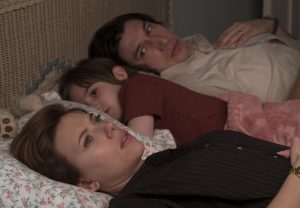
Divorcing parents Nicole Barber (Scarlett Johansson, left) and husband Charlie (Adam Driver, right) wrestle with custody issues involving their young son, Henry (Azhy Robertson, center), in director Noah Baumbach’s “Marriage Story.” Photo by Wilson Webb, courtesy of Netflix.
It isn’t until Nicole arrives in California that viewers begin to learn what’s really been going on between her and Charlie. During impassioned venting sessions with her mother, Sandra (Julie Hagerty), her sister, Cassie (Merritt Wever), and especially her newly hired divorce lawyer, Nora Fanshaw (Laura Dern), Nicole offloads what’s been bugging her. And she has a lot to say.
According to Nicole, Charlie perpetually put his vocational needs first, making her aspirations secondary, despite his willingness to feature her prominently in his theatrical productions. This, combined with the obligations of motherhood, left her feeling unfulfilled, dismissed and ignored (in a word, “smaller”). What’s more, as an Angelino by birth, she longed to explore career options in her hometown and not just those on the New York stage, something she claimed Charlie always downplayed or placed on the back burner. Oh, and, if that weren’t enough, she suspects he slept with his theater company’s stage manager.
Upon hearing all this, Nora convinces Nicole that she’s got quite a case, one ripe for a generous settlement. However, this news only serves to inflame an already-tense situation. When Charlie learns that Nicole has hired an attorney, he’s upset, given that they had originally agreed to work out their separation without lawyers becoming involved. What’s more, once Nicole’s TV pilot is picked up as a series, she decides to relocate to California permanently, a living arrangement that includes Henry. What started out as a hoped-for amicable parting has now begun to get ugly.
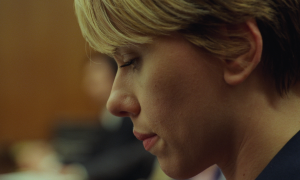
Nicole Barber (Scarlett Johansson) seeks a divorce from her husband Charlie, claiming that he’s placed her needs secondary to his, as seen in the gripping new drama, “Marriage Story.” Photo by Wilson Webb, courtesy of Netflix.
To protect his rights, Charlie amps up his game by looking to hire an attorney of his own, Jay Marotta (Ray Liotta), a hard-nosed, pricey counselor who is everything that he had hoped he could avoid. He soon discovers, though, that Jay is someone whom he neither can nor wants to afford, both financially and ethically. Yet, if he’s to preserve his child custody rights, he needs to find replacement counsel quickly, a requirement that urgently leads him to Bert Spitz (Alan Alda), a less expensive, more conciliatory family law attorney.
On Bert’s advice, to help secure his rights in the eyes of the court, Charlie rents an apartment in Los Angeles to demonstrate his desire to be close to his son. He begins dividing his time between the coasts, working on the launch of a new Broadway production while doing what he can to try and keep things civil in his divorce proceedings. Circumstances deteriorate further, though, when the legal bickering intensifies, with accusations and maneuverings that become downright vicious, sometimes to an utterly preposterous level. Even Jay returns to the fray when Charlie admits he needed to hire “an asshole of his own” to fight on his behalf. By this point, it’s hard to imagine that these two people ever loved one another – or that they’ll ever be able to reach a workable agreement, especially where Henry is concerned.
Many of us would naïvely like to believe that love is all it takes to make a relationship succeed. If only that were true. However, as anyone who has ever been involved with someone for the long term knows, it calls for more than just a romantic connection. It also takes a commitment to hammer out all of the details that go into building a partnership on multiple levels, all of which require a high degree of mutual agreement for them to work. And that may prove to be more challenging than being able to love someone else, no matter how much.

Charlie Barber (Adam Driver) struggles to hold on to his child custody rights in contentious divorce proceedings with his wife, Nicole, in director Noah Baumbach’s “Marriage Story,” now available for streaming on Netflix. Photo by Wilson Webb, courtesy of Netflix.
How all of those other elements come together depends on the beliefs held by each party, and that’s important to recognize, for those intentions lead to what a couple manifests. Such is the outcome of the conscious creation process, the philosophy that maintains we draw upon those metaphysical building blocks in materializing what we experience.
Given the challenges we can each experience in successfully formulating, defining and implementing our manifesting beliefs, it can be that much more difficult when having to get two individuals on the same page when it comes to this process. And, when seeking to build a life together, think about the myriad areas in which a couple needs to pursue belief agreement – living arrangements, finances, career aspirations, having children and hopes for the future, to name but just a few. Now, considering that many of us have trouble enough achieving satisfaction in any of those areas by ourselves, it’s truly quite an undertaking when partners seek to tackle them together. The fact that a couple is able to attain concurrence on any one of these various fronts – let alone all of them – is indeed amazing. Which is why it’s not entirely surprising that disagreements are going to occur along the way. And, if there are enough of them, it’s not too difficult to imagine discord springing up in the relationship. Should they reach a serious enough degree, the relationship can easily be thrown into jeopardy – which can lead a couple to where Charlie and Nicole are at.
This is not to suggest that such situations are irreparable. If both partners are aware of a problem, they can discuss the matter, preferably by deeply examining the beliefs that are the root cause of the disagreement. Through effective listening and a willingness to cooperate in finding a workable solution, it’s entirely possible for a couple to rewrite their beliefs to more amenable notions that address the issues at hand and give them both what they want. Everybody wins.

Divorce lawyer Nora Fanshaw (Laura Dern, left) advises her client, Nicole Barber (Scarlett Johansson, right), about her rights in parting from husband Charlie in director Noah Baumbach’s latest offering, “Marriage Story.” Photo by Wilson Webb, courtesy of Netflix.
However, when those considerations aren’t brought into play, it’s not unusual for circumstances to spin out of control. Those conditions, in turn, can lead to the formation of negative beliefs that each partner may begin to hold about the other – beliefs that don’t do much to nurture and support the viability of the relationship, such as resentment and spite. Once qualities like that enter into the mix, it becomes increasingly difficult to go back, even to recognize the love that birthed the partnership in the first place. With the well poisoned, it’s often downhill from there, especially if advocates for each partner become involved and turn up the volume of the arguments between them. And, again, you have Charlie and Nicole.
One of the points “Marriage Story” drives home quite effectively is how totally absurd some of these vindictiveness-driven beliefs can become. Divorcing partners and their attorneys can distort their impressions of one other all out of proportion, resulting in ludicrous, completely inaccurate, even laughable depictions of one another. This can be especially true when implemented to drive up the stakes of a settlement, a distinct act of un-conscious creation, where beliefs are put into place simply to achieve a particular outcome with no consideration for the consequences. The result can be far more devastating for all involved (and that can include more than just the divorcing partners, such as situations where children are involved).
The key to avoiding such outcomes – and perhaps to avoiding divorce in the first place – is to aspire to successful acts of co-creation. Through this practice, both partners seek to formulate, define and implement beliefs aimed at achieving mutually agreeable results, no matter what aspect of the relationship is being addressed. If employed as an overarching principle in the way the marriage works, there is a far greater likelihood of achieving harmony and long-term success. And, even if the relationship ultimately does not succeed, divorcing partners could at least attempt to employ co-creation as a means of coming up with a workable settlement, one that leads to separation on amicable terms, particularly where custody questions come into play. One can only hope that Charlie and Nicole will find it within themselves to come up with such a solution for themselves – if not for their own sake, then at least for Henry’s.

Divorcing parents Nicole Barber (Scarlett Johansson, left) and husband Charlie (Adam Driver, right) embark on a bitter course of proceedings in director Noah Baumbach’s “Marriage Story.” Photo by Wilson Webb, courtesy of Netflix.
While some critics and viewers have correctly said that this film covers ground that’s been addressed before and that it occasionally tends to play like both a therapy session and a legal consultation, writer-director Noah Baumbach’s latest nevertheless offers an engaging mix of heartache and humor, showing the pain and utter absurdity that goes into the dissolution of a marriage. The truly superb ensemble cast, with excellent performances by Johansson, Driver, Liotta, Hagerty, Alda and, especially, Dern, coupled with a razor-sharp script, make for a dynamite combination that reaches out, grabs and holds audience attention from beginning to end. Arguably Baumbach’s best film, this offering is more than deserving of all the praise that it has rightfully had heaped upon it. You’ll laugh, you might cry and you’ll definitely feel the heart strings tugged with this one, but the picture assuredly earns the reactions it evokes. The film is still in limited theatrical release and is also available for streaming on Netflix.
“Marriage Story” has already picked up quite a haul of awards season nominations, with more likely to follow. The picture leads the pack of this year’s Golden Globe Award offerings, earning nods for best dramatic picture, best screenplay and best score, as well as acting nominations for Driver, Johansson and Dern. It also scored big in the Critics Choice Award competition, with nominations for best picture, best director, best screenplay and best score, along with acting nominations for Driver, Johansson, Dern and the ensemble cast. Driver, Johansson and Dern picked up additional nominations for their performances in the Screen Actors Guild Awards contest, portrayals that helped earn the picture a National Board of Review Award as one of 2019’s Top 10 Films. And, in the Independent Spirit Awards competition, “Marriage Story” has already been named the winner of the Robert Altman Award for best ensemble cast, as well as a best screenplay nominee.

In an age when so many of us find ourselves at odds with others, it would be comforting to believe that we could at least find protection from those storms in the sanctuary of our relationships. Unfortunately, even those involvements aren’t always immune from the impact of such contentiousness, presenting us with another source of conflict, one that can be particularly disconcerting given the highly personal arena in which the disagreement unfolds. One can only hope that films like “Marriage Story” provide us with sufficient cautionary tales to avoid the pitfalls of relationships gone awry – and remind us of the tremendous joys that got us into them in the first place.
Copyright © 2019, by Brent Marchant. All rights reserved.
The post ‘Marriage Story’ showcases what makes a relationship succeed – or fail appeared first on Brent Marchant.



